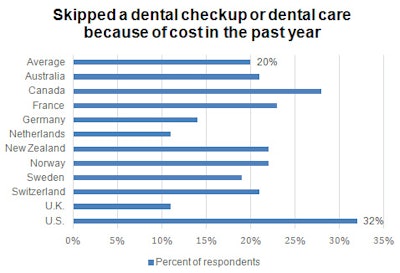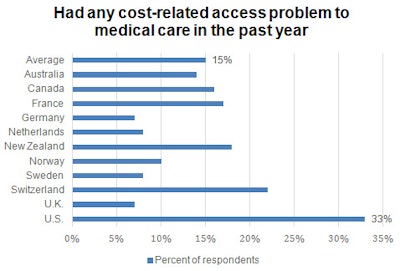
The U.S. lags behind 10 other developed countries when it comes to access to affordable dental care, according to a new study. Americans are also more likely to report having financial struggles and worse overall health.
The Commonwealth Fund, a private foundation that conducts independent healthcare research and provides grants, completed a survey of adults in almost a dozen developed countries, including the U.S., Canada, Australia, and the U.K. More adults in the U.S. reported skipping a dental checkup or dental care because of cost than adults in the other countries.
Compared with adults in the other 10 countries, adults in the U.S. are sicker and more economically disadvantaged, according to the study authors, led by Robin Osborn, vice president of the International Program in Healthy Policy and Practice Innovations at the Commonwealth Fund.
"The resulting challenge to the U.S. health system is compounded by higher healthcare costs, greater income disparities, and relatively low levels of spending on social services, compared to other countries," they wrote (Health Affairs, November 16, 2016).
Americans struggle to afford dental care
The Commonwealth Fund has been surveying patients from multiple countries about their healthcare experiences for almost 20 years in hopes that the results will help policymakers create innovative systems and improve health outcomes. This year, the foundation chose to focus its survey on the healthcare experiences of adults in the general population. Researchers conducted landline and mobile phone surveys with thousands of participants in each of the 11 selected countries in their native languages.
Osborn and colleagues found that adults in all countries except the U.S. reported cost to be a greater barrier to accessing dental care than medical care. However, a greater percentage of U.S. adults (32%) cited cost as a reason for skipping a dental checkup or care, compared with the lowest percentage of 11% for adults in the Netherlands and U.K. who reported cost as a barrier.

On the positive side, U.S. adults were more likely to report that a healthcare provider talked to them about a healthy diet than adults in other countries. The researchers presumed this is likely because more of the U.S. population is obese or sedentary.
Primary care also falls short
The U.S. also falls behind the other countries when it comes to access to primary care. Slightly more Americans cited problems accessing affordable medical care than dental care. However, over time, there has been a significant decrease in the percentage of Americans who cited an access-to-care problem related to cost, dropping to 33% this year from 37% in 2013.

U.S. adults also reported worse mental and physical health, with about 27% of Americans having at least two chronic conditions, and another 27% experiencing emotional distress in the past year. Part of the distress may be due to financial concerns. U.S. adults were far more concerned about not having money to pay their rent or mortgage, as well as buy nutritious meals.
"Relative to other countries, the healthcare system in the United States appears to perform poorly in meeting several population health goals," the authors wrote. "Out-of-pocket spending is an important barrier to care in the United States, reducing access to services."
Fixing the U.S. healthcare system
The survey had a number of shortcomings, including a potential lack of populations within countries that are more difficult to reach, such as immigrants and those who do not own mobile or landline telephones. In addition, the study authors believed the survey response rate, which ranged from 11% in Norway to 47% in Switzerland, was reasonable but could have been better.
It is also important to note that the survey was focused on adults' perceptions of their own
“Improving the performance of the U.S. healthcare system, however, will require a sustained commitment over the next decades.”
Osborn and colleagues hope their paper highlighted the strengths and weaknesses of various healthcare systems. They also noted that, as the U.S. continues to reform its healthcare system, policymakers should look at what is working in other developed countries.
"Improving the performance of the U.S. healthcare system, however, will require a sustained commitment over the next decades, including the expansion of health coverage to the 23 million Americans and undocumented immigrants who still lack insurance, a willingness to learn from the implementation of the new healthcare delivery and funding models that are being tested, and having a national conversation on how to get the balance right between health and social care spending," the authors concluded.



















